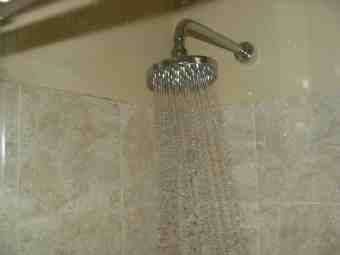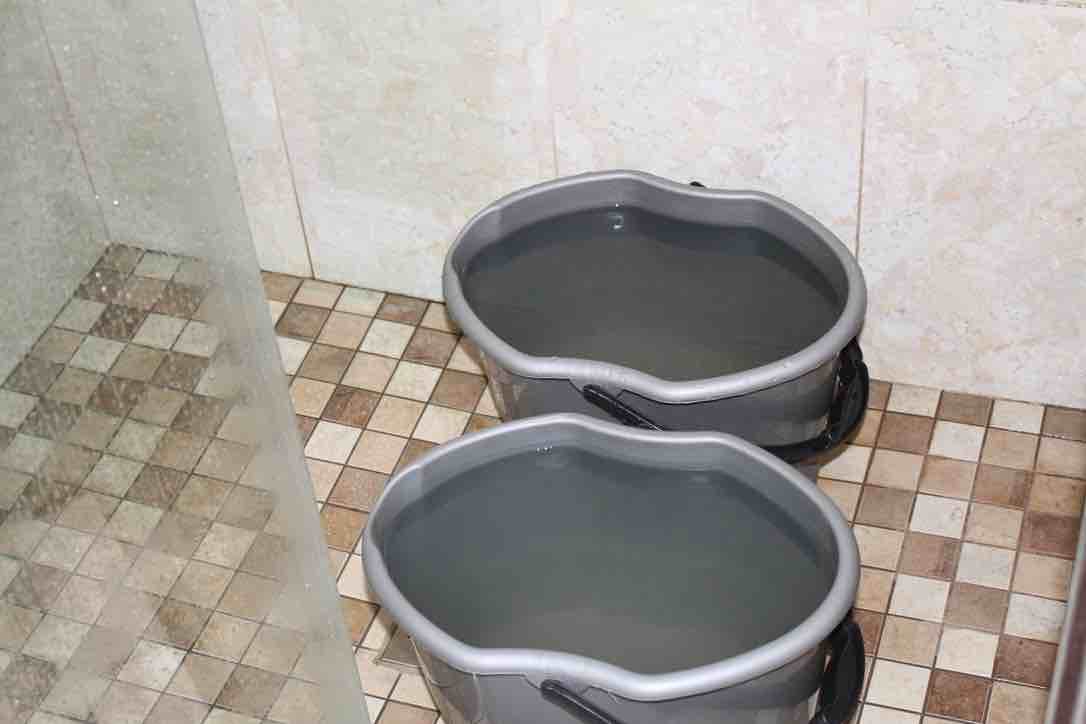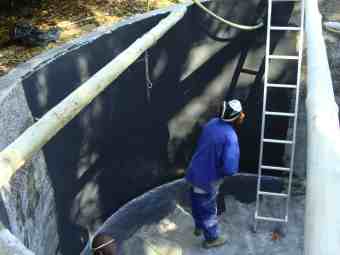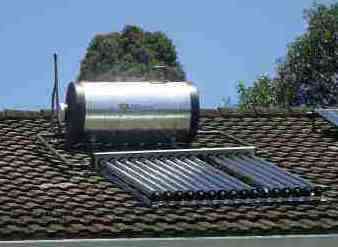- Bernard Preston homepage
- Our green rainwater
- Bath Vs Shower
Bath vs shower
Bath vs shower reveals that the latter is definitely more efficient. During droughts it is also easier to collect the water while standing in mopping-buckets.
There are three issues, to my mind. The first is cleanliness, the second relaxation and the third the use of one of the world's most valuable resources; you might add to those the effect on the skin of indulgent bath salts and luxurious oils.
I do not think there are many of us who would disagree that you can get your body cleaner by showering, rather than lying in your own dirty water.

Bath vs shower is an old debate but hangs largely on personal preference. Bernard Preston enjoys an indulgent, full-stream deluge using soft harvested rainwater.
This page was last updated by Bernard Preston on 5th September, 2023.
I would add secondly that washing your hair in the shower is a definite plus. The basin is an invitation for a disaster; bending thus is a not infrequent cause of acute lower back or neck pain.
In the shower you can certainly get more of the soap and conditioner out of your hair, as compared to the bath; I also have reservations of the effect of those chemicals on our well-being. Research in the Netherlands, for example, reveals that men who use cosmetics are significantly less fertile.
I am pretty sure shampoo qualifies as a cosmetic; and so getting all of it out of your hair is an important issue. Use the shower.
A bath with a shower-head on the side would qualify.
And thirdly water scarcity in the world is the norm in many cities. Standing in two of these elongated buckets means it is easy to harvest your detritus for flushing the toilet. Do not fill them to the brim; you may find yourself scheduling a visit to consult your DC.
These are overfilled.

Bath vs shower
Bath vs shower reveals that the latter is definitely more water-efficient.
A half bath which is probably what most of us would use, contains about 100 litres of water. After a sunny day that would be about one-third of hot from the geyser; and the remainder from the cold tap.
Most days you would perhaps be using 40 percent hot water; the geyser requires a lot of electricity or gas.
The average person apparently enjoys an eight-minute shower.
The normal shower-head uses 10 litres per minute; which translates into about 80L if you take a longish indulgence.
Our full shower-head, only morally justifiable as the water comes entirely from rainfall, uses 50 percent more; in eight minutes 120 litres.
A low-flow shower head might use only 40 litres.
So a ten-minute shower, using an average head requires the same amount of water as half a bath; there's not much in it.
Bernard Preston's fifteen minute shower uses 250 litres of soft water; it is entirely relaxing and indulgent but is only for those who harvest the rain.
Water-saving shower head
In August 2016 I was doing a locum in Holland; in the home where I was staying there is a water-saving shower head. There is also a bath which is not common in the Netherlands.
I was inclined to indulge for the first time in many years in the bath vs shower debate; but did not. Habits are ingrained.
I never realised just how unsatisfying the jet from the water-saving head is; the indulgent shower enjoyed by those who harvest the rain alone makes it worth the effort.
Late winter rains have this year filled the reservoir so we will again not have to use a drop from the municipal reticulation; that in fact has only been needed for two months in more than a decade during a severe drought. It is best to remain connected to the utility even if you require very little.

Rainwater harvesting
Rainwater harvesting into a reservoir such as this is really not difficult, nor particularly expensive unless you choose to line it with fibre-glass. The beauty of it, of course is that it renders the bath vs shower debate meaningless; you can have your cake and eat it.
Water scarcity in the world is a reality for many; harvesting your own rainfall is not only cost-effective but contributes to a greener planet. This is what we call creating a cyan zone; caring for your family and Mother Earth.
You can have your three-quarters full bath, or your long indulgent shower and enjoy it quite without guilt; you are not wasting the Earth's resources. The water simply passes from the heavens into your reservoir, through your home and back into the ground where it was heading anyway.
As far as relaxation is concerned, it is entirely a personal preference. Bernard Preston hates a bath and has used the one in his own home only three times in eight years; he could have done it daily with no recourse to the utility.
The good wife on the other hand uses it almost daily; with a shower perhaps twice a week, mainly to wash her hair and get all those chemicals out.
In the bath vs shower debate, I believe relaxation to be a non-issue; it is personal preference.
As far as the bath salts and luxuriant exotic oils for our skin, I am afraid I cannot comment. If it requires a rather fuller bath to totally immerse the body then, yes it uses more water.
Gardeners have a lot of ingrained dirt in their feet; it is true that a good soak in the bath gets them cleaner.
These are our water innovation ideas. What are yours?
Personally I am not into saving teaspoons of water; let us do it properly to make an impact.
Bernard Preston
Bernard Preston is a semi-retired DC who has become something of a greenie. He is glad that in their home the bath vs shower debate is completely irrelevant; both he and the good wife have unrestricted access to hot water.
The green journey is really more of a spiritual voyage; it has to do with such matters as leaving a habitable planet for our grandchildren so they will not curse the graves where we hope our remains will lie unmolested.
That means wean off plastic and the race to end waste of food; uncomfortable thoughts.
The large underground reservoir for harvested rainwater situated close to the house provides all the needs of their home and garden; they even drink it without filtration. Interesting research suggests that our obsession with a bacteria-free environment may be the cause of an underdeveloped immune system; that makes us vulnerable when bacteria and viruses strike.
Saving electricity
"Don't boil three cups worth of water in your kettle when you are going to have just one mug of tea."
- Dr Daniel van Schalkwyk
Using hot water intelligently is one of the most important ways of reducing our electricity consumption. Turn your geyser on 2 hours before showering or bathing; and off before jumping in.
If only one person is going to shower, then raise the breaker only half an hour before getting in. The water needs to be hotter when bathing; using more electricity.
"It is most important to switch off the geyser before starting to draw water."
- Prof MJ Booysen
When browsing use right click and "Open Link in New Tab" or you may get a bad gateway signal.
Newsletter
Our newsletter is entitled "create a cyan zone" at your home, preserving both yourself and Mother Earth for future generations; and the family too, of course. We promise not to spam you with daily emails promoting various products. You may get an occasional nudge to buy one of my books.
Here are the back issues.
- Lifestyle and ideal body weight
- What are ultra-processed foods?
- Investing in long-term health
- Diseases from plastic exposure
- Intensive lifestyle management for obesity has limited value
- A world largely devoid of Parkinson's Disease
- The impact of friendly bacteria in the tum on the prevention of cancer
- There's a hole in the bucket
- Everyone is talking about weight loss drugs
- Pull the sweet tooth
- If you suffer from heartburn plant a susu
- Refined maize meal and stunting
- Should agriculture and industry get priority for water and electricity?
- Nature is calling
- Mill your own flour
- Bake your own sourdough bread
- Microplastics from our water
- Alternative types of water storage
- Wear your clothes out
- Comfort foods
- Create a bee-friendly environment
- Go to bed slightly hungry
- Keep bees
- Blue zone folk are religious
- Reduce plastic waste
- Family is important
- What can go in compost?
- Grow broad beans for longevity
- Harvest and store sunshine
- Blue zone exercise
- Harvest and store your rainwater
- Create a cyan zone at your home
You will need one of the self priming pumps if you plan to harvest your own rainwater, and use it in the home and garden.
If you want to split hairs then one might also want to consider how much electricity is used to pump the water from the large dams to your home. Since ours is driven entirely by our solar generator, using only sunshine energy, it is another plus on the side of backyard permaculture; working with nature instead of against it.
Also our passive solar water heater uses no electricity; the vacuum in one tube was defective on arrival and had to be replaced.

The Shower is a titivating chapter from one of Bernard Preston's books.
Did you find this page interesting? How about forwarding it to a friendly book or food junkie? Better still, a social media tick would help.
- Bernard Preston homepage
- Our green rainwater
- Bath Vs Shower
Address:
56 Groenekloof Rd,
Hilton, KZN
South Africa
Website:
https://www.bernard-preston.com